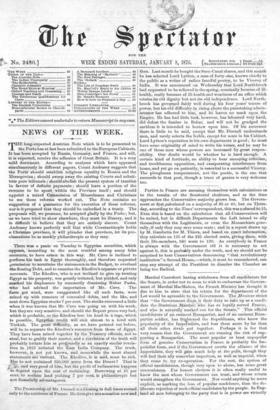then. Last month he bought the Suez-Canal shares, and this
month he has selected Lord Lytton, a man of forty-one, known chiefly to the public as a writer of rather fanciful poetry, to be Viceroy of India. It was announced on Wednesday that Lord Northbrook had requested to be relieved in the spring, nominally because of ill- health, really because of ill-health and weariness of an office which retains its old dignity but not its old independence. Lord North- brook has governed fairly well during his four years' tenure of power, but his old difficulty in rising above the painstaking admin- istrator has adhered to him, and he leaves no mark upon the Empire. He has had little luck, however, has laboured very hard, did defeat the famine in Behar, and will not be grudged the earldom it is intended to bestow upon him. Of his successor there is little to be said, except that Mr. Disraeli understands men, and rarely selects the feeble, except for seats in his Cabinet. Lord Lytton's reputation in his own department is good ; he must have some originality of mind to write his verses, and he may be one of those men whose powers are increased by great respon- sibility. Our doubt would be whether he is hard enough. A certain kind of fortitude, an ability to bear annoying critieism, and troublesome opposition, and exasperating interference from home, and yet go on patiently, is essential to a successful Viceroy. The ploughman temperament, not the poetic, is the one that succeeds in that post, though a trace of genius is very welcome too.


































